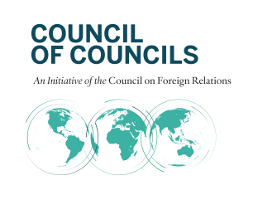Activist Post | December 29 2012
Council of Councils Members
 It is incredible that mention of a one-world government in many circles is still considered to be conspiracy talk. Fortunately, the global political awakening that arch-globalist Zbigniew Brzezinski has referred to is forcing ever-increasing justifications for their use of globalist language.
It is incredible that mention of a one-world government in many circles is still considered to be conspiracy talk. Fortunately, the global political awakening that arch-globalist Zbigniew Brzezinski has referred to is forcing ever-increasing justifications for their use of globalist language.
One would hope that a relatively new Council on Foreign Relations initiative that is expanding can lay to rest any debate about the desire to form a global government in the name of supposedly solving global problems.
The initiative called The Council of Councils was featured in a recent round table discussion of the central problems facing the world that they believe require multilateral cooperation. The discussions and recommendations released from this convention of experts is important to keep available the next time you hear the label conspiracy theorist hurled in your direction. The title of the round table was Challenges for Global Governance in 2013.
Just as we have seen from other think tanks such as the Project For a New American Century, The Royal Society, and the Brookings Institution, among others; their thoughts translate to reality on a less-than-coincidental frequency, so we would do well to listen to what they are saying.
The Council of Councils initiative was announced in March, 2012 and clearly identifies a strategy for forming alliances across a series of shared concerns as set forth by the CFR. It is important to note from the beginning that the CFR bills itself as non-partisan; and here is where the uninitiated can immediately be tripped up. Non-partisan sounds like a good thing, going beyond typical party divisions, while striking a note that rings of independence and an objective search for the truth.
However, when one understands that in their own words, “The founding membership of the Council of Councils includes leading institutions from nineteen countries, roughly tracking the composition of the Group of Twenty (G20),” we begin to get an inkling that their version of non-partisan means that they are flexible in their use of whatever political language is expedient to get results that go beyond any concept of nationalism.
